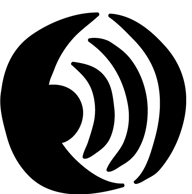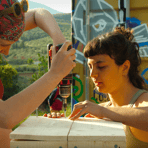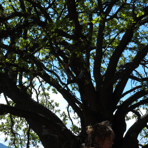In March, we head to Greece. We had some hesitations about our trip: are we going to hitchhike or are we going to be crammed in a Flixbus for hours? Forget it, we are going there by boat, like Homeric characters. Even if progress has greatly simplified this trip, we can still call it an epic: a blablacar trip and a night in Turin, a train to Brindisi, a night in a ferry to Patras. From there, a failed hitchhiking attempt, a bus, finally Corinth, where they pick us up and drive us to Hopeland, an "eco-community" built around education in the Peloponnese, near Mycenae, one of the most important cities of the Mycenaean civilization.
Created by Erato, a Greek woman, Hopeland was originally intended to provide families with the opportunity to find solace outside of the cities. As a family psychologist, she witnessed the development of unhealthy educational patterns and the "inability of city education to inspire love and learning". She chose this three hectare piece of land for its century-old olive trees, its many almond trees and, above all, for its four century old oak tree, which has become the symbol of the place. Since the beginning Hopeland, which is managed by a cooperative, has aimed to value this land by developing actions related to the environment, the culture, and personal development, while looking to become a model of self-sufficiency and sustainability.
It’s been ten years since the creation of the place, and we drop our luggage in the Guest House. While surfing on Workaway, we had initially proposed Hopeland to volunteer for three weeks. The hopelanders then suggested that we participate in another way, by taking part in “Eyes Wide Open”, a month-long project along with fifteen other young Europeans. The idea of the project is to create a community around the ecological project of Hopeland: manual work, connection with the territory and possibility for the community to leave its trace on the land. However, we do not fall into the trap of naivety: in our opinion, focusing on the reception of young Europeans leads to hypermobility and does not meet the needs of the local community, the attention to the newcomers limiting the creation and the care for real connection with the locals. The ecological commitments of Hopeland are translated in a concrete way. In terms of agricultural production, permaculture techniques were adopted early on. Moreover, vegetarian food is the norm. As for energy, the buildings are powered by solar electricity. The project is part of the "European Solidarity Corps", which is funded by Erasmus+. This means that our round trip is reimbursed, and we have pocket money, five euros per day.
As the project goes on we discover an almost underground world of funded Erasmus+ solidarity projects, about which we promise to add more information in the useful resources section. It’s thanks to Erasmus+ that Hopeland is able to implement the educational projects that take place there. To that, they also welcome woofers and workawayers, but they have to pay 5 euros per day.
In short, we had the impression to live a month of fun and lightness, surrounded by young ecologically conscious adults, all searching for a deeper sense of collectiveness. One month during which 18 people, from 18 to 30 years old, welcomed by the members of the community, have lived together to share a collective experience, to take care of the land, to make it grow, to make it live and to learn together. Memories of summer camp...
Every Monday, a meeting near the oak tree: the distribution of collective tasks for the week takes place by a show of hands. Pairs and triples are created: they cook for the collective, water the garden, clean the common areas, take care of dogs, cats and chickens. Friday afternoons are devoted to reflection on our work and emotional wellbeing during the week. Weekends are free, an opportunity to spend our pocket money on local specialties: ouzo, baklava, feta.
The first week we get to know each other. Workshops to break the ice, loosen our tongues and minds. Then we work. Our task: assemble the "village-tipis" in which we sleep. Two days of collective construction for these temporary homes which welcome different Erasmus+ groups throughout the summer season. We also take turns sifting horse manure for hours, which will be used as an eco-building material. Mixed with a base of béchamel (flour and water cooked until thickened), clay and sand, this unorthodox mix allows to finish the floor of the "Round Building", a building dedicated to the community, completely eco-built.
The second week is built around the visit of Steven and Chenny, two experts in permaculture who have founded a farm project just two hours away from Hopeland. They know everything about each plant, each tree and each "weed". We quickly realize how many herbs are carelessly pulled out, when actually they’re delicious in the pot. Steven and Chenny are our guides in the collective work of expanding the vegetable garden. In two days, seven vegetable patches come to life: tomatoes, beans, peppers, lettuce, beans, onions, calendula and strawberries are planted. Between soil composition, permaculture design, the importance of flat surfaces for a more efficient absorption of rainwater and the culinary and medicinal uses of dozens of plants, manual work and intellectual work mix and feed each other. In the afternoon we discuss possible crop combinations that allow plants to help each other. A good example of this are the famous “three sisters”: corn, beans and squash. The corn serves as a support for the bean plant, which has the ability to trap the nitrogen in the air and return it to the soil, and the squash keeps the soil cool thanks to its large leaves. The power of the collective at this point is impressive: all these active and moving bodies give so much energy that you would think they could carry wheelbarrows full of stones for hours (and they do).
The third and fourth weeks are devoted to "personal projects", where each person is free to propose and organize a project, alone or in group, in line with the values of Hopeland. The idea is to "mark and anchor" one's passage and to participate in the improvement of the place: construction of needed structures, development of connection with the territory, artistic projects... A group of girls decided to build a wooden shelf for the common dining room. From the measurements and the plans to the varnishing and assembly, the 3.10m by 2.80m "Queer Shelf" - since it's not "straight" - comes to life. Others made an inventory of the plants of the territory to make a herbarium, specifying their uses. One person met with local producers and learned directly from them how to make feta and mizithra (traditional Greek cheeses), koulouri (sesame bread) and melitzanes me saltsa (eggplant with tomato sauce), to then arrange a big Greek aperitif with all those delicacies. Yiamas! At the end of the last week, we even ran the half-marathon from Mycenae to Argos, with a stand of Hopeland behind the finish line.
We think this project would benefit from more politicization of conversations, learning processes and daily actions. It seems dangerous to us to omit such important aspects of ecology: its political meaning, the history of its struggles and the seriousness of the ongoing ecocide in favor of a more individualistic understanding of ecology towards which personal development is pushing.


